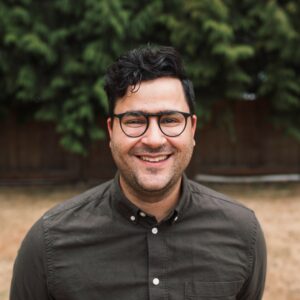“Why disability?” An invitation to (re)consider what we mean when we use the word ‘disability’
by Michael Morelli, PhD
“Why disability?” It’s a question I often hear when people discover I care deeply about people called ‘disabled.’ I spend time with 'them,' and speak, teach, and write about 'them.' So, sadly, I am often asked about them. I am able-bodied as far as most people can tell, so I think people ask me this question because they find it strange to encounter someone like me involved in what is commonly called ‘disability theology and ministry.’ But I am less able than I appear.
People close to me know I have lived with Crohn’s disease for nearly two decades. They know about my multiple hospital stays, three body altering surgeries (two of which were emergency procedures), numerous medications, mass quantities of medical supplies, and innumerable appointments, referrals, consults, tests, exams, scans, probes, scopes, diagnoses, shots, draws, IVs, pokes, and prods.
Still, I hesitate to use the word ‘disabled’ to describe myself, not because I would be ashamed to identify as or be called ‘disabled.’ Rather, my hesitancy stems from awareness that the relative invisibility of my chronically dis-abling condition means I do not experience the marginalization, discrimination, and harm people with more visible disabilities experience on a day-to-day basis.
So I exist in a strange, mostly wonderful, sometimes lamentable in-between space nestled between people called ‘disabled’ and people who are not.
Here is what is strange, wonderful, and lamentable about this in-between space.
It is strange because I paradoxically fit in everywhere and nowhere.
It is wonderful because fitting in everywhere and nowhere means I get to meet and become friends with a wildly wide range of amazing people.
It is lamentable because so many of the amazing people I meet and become friends with and who draw me closer to God are so often viewed and treated as deficient, pitiful, shameful, inconvenient, awkward, disgusting, evidence of a fallen, broken, and sinful world, and/or a means to the end of cathartic inspiration.
This is why I am constantly inviting people to enter the in-between world I am privileged to be a part of. It is a world where and when, slowly, surely, and sometimes in the blink of an eye, a person can discover as I have discovered that what most people call and treat as ‘disability’ is not a mark of deficiency, pity, shame, inconvenience, awkwardness, and disgust; it does not signal a fallen, broken, and sinful world; it is not a means to the end of able-bodied people feeling inspired and/or better about themselves; and, it is given to us by God in mysterious, wondrous ways that often lead to revelations of God’s presence rather than his absence.
When Moses encounters God at the burning bush and is told he will lead Israel out of slavery, Moses says God must have the wrong guy because he is “slow of speech and tongue.” But God replies to Moses, “Who gives speech to mortals? Who makes them mute or deaf, seeing or blind? Is it not I, the LORD?” (Exodus 4:10-11).
Here, and in so many other places in scripture (e.g., John 9), we can encounter the life-changing truth that what commonly is treated as ‘disability’ is given to us by God to show us who God is, what God is like, and who we really are created by God to be in light of who God is and what God is like.
And that, friends, is one way among many, that I answer the question “why disability?” when people ask it.
 Michael Morelli (PhD), is Assistant Professor of Theology, Culture & Ethics, as well as Manager of Life Long Learning. Michael is our in-house philosopher and theologian, ready for any conversation that involves serious, and sometimes not so serious, thought. When not cooking up thoughts, he'll happily cook you a meal or brew you a coffee. His wife and sons keep him hopping, and his guitar keeps them rocking.
Michael Morelli (PhD), is Assistant Professor of Theology, Culture & Ethics, as well as Manager of Life Long Learning. Michael is our in-house philosopher and theologian, ready for any conversation that involves serious, and sometimes not so serious, thought. When not cooking up thoughts, he'll happily cook you a meal or brew you a coffee. His wife and sons keep him hopping, and his guitar keeps them rocking.